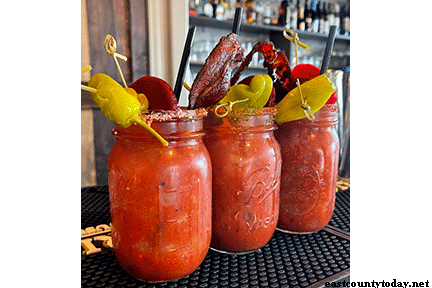Senator Scott Wiener (D-San Francisco) has introduced “booze zones” under the name of “entertainment zones” where people can walk around with to-go drinks.
Under SB 969, local governments can designate “entertainment zones,” where restaurants and bars may sell alcoholic beverages for consumption in the specified zone. Similar programs to create “outdoor refreshment areas” have proven successful in supporting small businesses and downtown districts in other states, including in Michigan, Ohio and Virginia.
This new tool aims to enhance the experience and business opportunities of customers and sellers at existing events while creating the opportunity for novel and exciting activations that will draw out clientele and foster community. Cities will be able to choose to tailor “entertainment zones” to the individual needs of each locale and event.
Senator Wiener Introduces Bill to Activate Downtown Spaces, Boost Local Restaurants & Bars In Entertainment Zones
SACRAMENTO – Senator Scott Wiener (D-San Francisco) announced Senate Bill 969 (SB 969), which allows cities to create “Entertainment Zones” in public spaces where local bars and restaurants are allowed to serve alcohol outdoors. These zones will give bars and restaurants and the surrounding businesses a much-needed boost. By allowing this activity in targeted spaces designated by the local community, SB 969 will responsibly activate downtown streets where activity has struggled to rebound since the onset of COVID-19.
“Getting people back out in the streets is key to the economic recovery of cities across California,” said Senator Wiener. “By creating Entertainment Zones, we’re giving people a reason to go back to areas where recovery has been slow while creating a vital new revenue stream for bars and restaurants.”
The COVID-19 pandemic devastated foot traffic to downtown businesses. Cities in California vary widely in their recovery trajectories, but none has yet reached the levels of foot traffic seen in 2019 in their downtowns. Researchers at the University of Toronto found that San Jose has recovered the most foot traffic (96%), while Los Angeles is back to 83%, Redding to76%, and San Francisco to 67%. This reduced activity threatens to stymie economic recovery in San Francisco and across the state.
Outdoor events, including fairs and festivals, are key in many cities’ economic recovery strategy. These events bring critical boosts in tourism that many small businesses rely on to push them over the edge into profitability. The benefits and the increased spending spill over into non-tourism related industries as well, helping lift the entire economy.
Under current law, licensed businesses may set up booths to sell alcoholic beverages to-go, but neighboring restaurants and bars are forbidden from doing the same. SB 969 would allow municipalities to designate temporary Entertainment Zones in which brick-and-mortar bars and restaurants could sell alcohol to-go on equal footing with the festival’s licensed vendors.
Under SB 969, local governments can designate “entertainment zones,” where restaurants and bars may sell alcoholic beverages for consumption in the specified zone. Similar programs to create “outdoor refreshment areas” have proven successful in supporting small businesses and downtown districts in other states, including in Michigan, Ohio and Virginia. This new tool will enhance the experience and business opportunities of customers and sellers at existing events while creating the opportunity for novel and exciting activations that will draw out clientele and foster community. Cities will be able to choose to tailor “entertainment zones” to the individual needs of each locale and event.
SB 969 is sponsored by The City of San Jose, The City and County of San Francisco, and CalNight.
“This legislation will help revitalize and diversify Downtowns that need support, boost local economies, and support small businesses,” said San Francisco Mayor London Breed. “In San Francisco we are bringing different strategies to create more dynamic neighborhoods, especially in areas that for too long have been focused on simply being a 9 to 5 destination.. Entertainment Zones are exactly the kind of creative, flexible tool we need to help local jurisdictions build an even stronger economic recovery.”
“Downtown San Jose is recovering faster than any other major city in California — driven by people coming to our city’s core looking for experiences,” San Jose Mayor Matt Mahan said. “When safely implemented, SB969 would make it easier for local businesses to host block parties, wine walks and events that bring us all together to help drive the vibrant future of our downtown.”
“Downtowns across the State are struggling, and SB969 will give localities the tools they need to revitalize their core neighborhoods,” said Ben Bleiman of CalNight. “Entertainment Zones will draw workers back to the office, entice new businesses to lease office spaces, and act as a crucial lifeline to downtown small businesses from restaurants and bars to florists and barber shops!”
LEGISLATIVE COUNSEL’S DIGEST
- Dec 29 – ABC Highlights New Alcoholic Beverage Laws
- Oct 9 – Sen. Dodd’s To-Go Cocktails Measure Signed into Law


1 comment
Yes, this sounds like a Wiener proposal for sure.
Comments are closed.